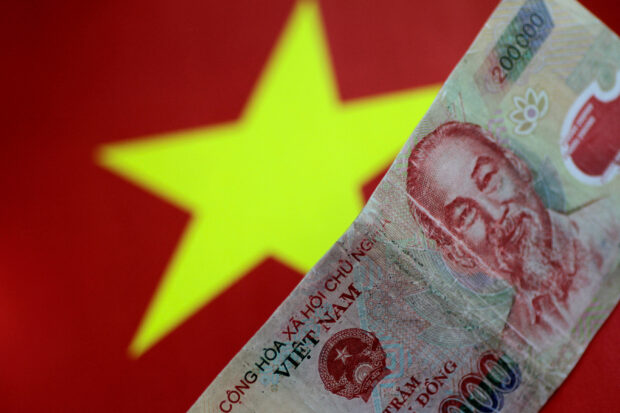Foreign firms warn Vietnam of investment freeze sans new tax offset

A Vietnam Dong note is seen in this illustration photo. May 31, 2017. REUTERS/Thomas White/Illustration/File photo
HANOI — Large foreign multinationals said they may freeze new investment plans in Vietnam in the absence of subsidies to help offset the cost of a new top-up tax, said a person involved in talks on the matter between investors and the government.
The investment-reliant manufacturing hub has been one of the main beneficiaries of companies relocating activity from China to minimize the impact of Sino-U.S. tension. But a tax hike alongside power supply problems, regulatory hurdles and wage increases may dent its competitiveness, analysts have said.
Vietnam this year introduced the 15 percent Global Minimum Tax on large multinationals, an initiative shepherded by the Organization for Economic Cooperation and Development (OECD). In accordance, incentives that lowered tax rates to as little as 5 percent will no longer be available, meaning some multinationals will effectively have to pay a top-up tax to meet the 15 percent rate.
READ: Vietnam parliament approves global minimum corporate tax
Some U.S. multinationals have called on the government to honor low-tax commitments it made to attract existing investment, adding that new investment would be difficult without measures to offset the top-up, the person said.
The government pledged new subsidies in the first half of last year but has been slow to introduce any.
New incentives fund
In December, it released a draft decree outlining new subsidies and conditions for eligibility, such as being classed as a high-technology company. But many key aspects remain undefined, such as the size of a new incentives fund, and there is no clear timetable for approval of the measures.
Representatives of multinationals on Tuesday raised concerns with officials of the Ministry of Planning and Investment about the size, scope and accessibility of the planned incentives, the person, who attended the meeting, told Reuters on condition of anonymity as the meeting was not public.
READ: Vietnam eyes multi-million-dollar handouts to Samsung, others to offset global tax -source
A representative for Lego Group, which is investing over $1 billion to build a new factory in Vietnam, asked whether firms not classed as high-tech such as Lego would be eligible for any of the subsidies outlined under the draft decree, to which a ministry official replied they would not, the person said.
The Danish toy maker confirmed to Reuters that one of its representatives asked a question on the matter in the meeting.
A representative for U.S. firm Amkor Technology, which is building in Vietnam a $1.6 billion plant to assemble, test and package semiconductors, said it has struggled to obtain classification as a high-tech company, the person said.
Cash handouts to investors
Representatives for Samsung Electronics, the largest foreign investor, did not intervene in the meeting, the person said. The South Korean company has been among the most vocal about measures to offset the increased tax burden.
Amkor Technology and the Ministry of Planning and Investment did not respond to requests for comment. Samsung declined to comment.
READ: Deal to force MNCs to pay at least 15% tax seen marred by loopholes
Through the top-up tax, the government has estimated additional annual tax revenue of 14.6 trillion dong ($591 million) from 122 foreign companies. It has said it intends to use this windfall to give cash handouts to investing companies.
Still, new subsidies would not offer direct compensation for the increased tax burden, in line with the Global Minimum Tax initiative, government officials told the corporate representatives on Tuesday, according to the person.
A direct link would breach the international agreement behind the initiative and could lead to the transfer of the additional revenue to multinationals’ home countries, OECD officials have said, though enforcement measures remain unclear.
However, for some companies, the new subsidies could cover a large part – if not all – of the top-up tax costs, experts familiar with discussions on the incentives have said.